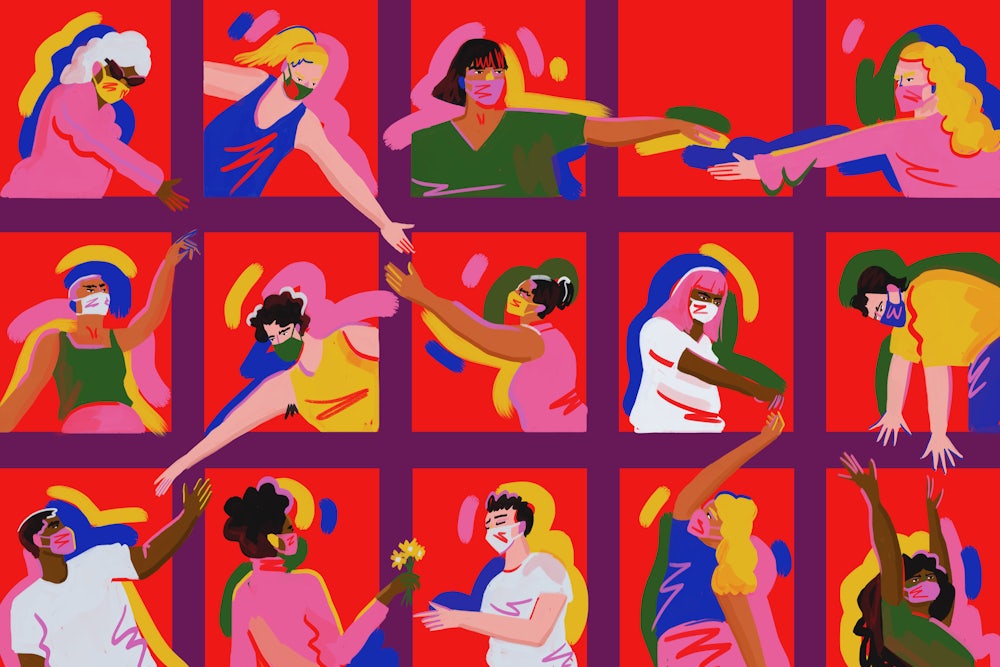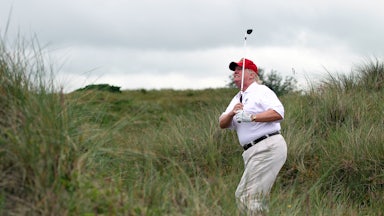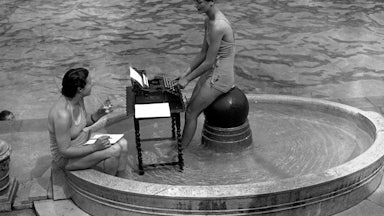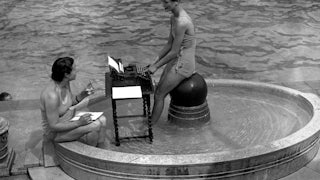In March of last year, Reddit user Oneawkwardpanda mentioned that the pandemic stay-home order had resulted in a “massive dip in productivity” for them and asked for advice. “How do you keep yourself accountable? How do you stop snacking?” Many others shared this anxiety about getting as much work as possible done from home; responses included setting up a home office, putting on a tie and shoes in the morning, and “parental controls on your laptop and phone or literally putting your TV in a closet.” Other users describe feeling guilty when relaxing or when not getting “eight hours of ‘real work’ done each day.”
Polartm, another Reddit user, captured the mood neatly: “You can turn this event into a positive,” they wrote around the beginning of quarantine. “Maybe this is finally the chance for you to get your life back on track and use it as an opportunity to improve your life and make the world a better place.” Polartm went on to recommend productivity hacks like drinking your water with apple cider vinegar and taking cold showers to “get your body uncomfortable and in shock.” The moral vocabulary in use here is clear: Quarantine and a global crisis of public health, like any other event, are experiences to be capitalized upon.
Our contemporary practices of glorifying productivity—our do-what-you-love ethos, the flood of self-help writing aimed at creating the appearance and the performance of never-ending work—shame idleness, attach a sort of divine purity to hustle, and raise questions about what leisure even is and who deserves it. This subtle, sleek commodification of experience in the name of some version of “living your best life” is not new; what has, over the last several years, become a cultural impetus to hustle is also built into decades-old political language. Even as we find new expressions of this drive toward ceaseless work, they still manage to feel familiar.
In August 1996, during his reelection campaign, Bill Clinton signed the Personal Responsibility and Work Opportunity Reconciliation Act, which added work requirements and other heavy restrictions to welfare. Traditional Democrats called it a “watershed defeat for liberalism” and “a moment of shame.” Clinton’s chief strategist, on the other hand, was triumphant. “That’s it,” he said. “The election is over.”
The new bill required 20 hours of “work” per week for single parents with children younger than 6 who wanted to receive welfare, and 30 hours for everyone else. The actual work required was baffling. Applicants reported meaningless busywork like sorting hangers and putting glue packets together, each gig unconnected to the last. The mandatory training was reported to be useless when applying for jobs in the fields in which recipients had been trained; those who managed to find full-time work afterward insisted that it wasn’t because the welfare requirements had built their skills in any way. One recipient described fulfilling the work requirements “knowing I’m not gonna get a job, but I got to go so I can keep my benefits coming.”
When volunteer jobs weren’t available, recipients were placed in job searches and required to prove that they had made a certain number of inquiries every day; one person said it was like “having to bring home a note to my momma to sign.” Once, she signed the form herself and, as predicted, “No one checked, but even having to do it one time was so stupid.” A senior vice president at the Center for American Progress’s Poverty to Prosperity program summed it up succinctly: “This isn’t about work; it’s about paperwork.”
Welfare reform was never about actual work, or creating real value, or tangibly improving people’s lives; it was about punishment and deprivation. It was also, like so much of our “hustle culture” today, about separating the virtuous from the sinful, using output and a certain kind of empty productivity as a gauge.
Such work for work’s sake is all-pervasive; it can be seen even in progressive policies like the job guarantee—a very practical policy, given that capitalism and inequality do indeed exist, but perhaps, suggests Kathi Weeks, author of The Problem With Work, not the most imaginative. A policy like the job guarantee, she argues, “reinforces rather than challenges” what Nicole Cox and Sylvia Federici called “the capitalist organization of society that imposes work as the only condition of our being allowed to live.” That work is demanded of people perhaps unable to carry it out, as with many welfare requirements, is only part of the problem, then. Even when work is provided and not demanded, there is still very little concern for the true worth of the work and, arguably, for the true worth of the person doing it.
On paper, Clinton officially brought in the era of personal responsibility, but the seeds for it had been sown by Reagan, who asked famously in his 1981 inaugural address: “If no one among us is capable of governing himself, then who among us has the capacity to govern someone else?” It was meant to encourage a very particular kind of economically minded citizen, aspiring toward self-sufficiency and individualism. The government’s role as primary protector of its citizens was already at the beginning of the end; citizens’ personal responsibility for themselves now included absolving the government of its own responsibility.
The contemporary narrative of individualism in our influencers, our hustlers, those who embody the always-be-working ethos, have roots in Clinton’s rhetoric of the self—but the idle busywork and performance of productivity now are done in the name of “freedom.” One travel and lifestyle influencer—in talking about being a full-time “nomad” as a solution to the horror of what she called “you go to college, you get married, you have kids, you get a job”—ended up talking mostly about how to be a full-time self-publicist; her life story contains more tips and hacks for finding the right contacts at media outlets and the right angle for pitching and selling every individual experience.
There is no difference between work and leisure here, in this life of supposed freedom from having an office job. An influencer’s leisure time, like the hours that unemployed people spend not working, is tyrannically monetized, expected constantly to turn a profit. In his 2015 book, Knocking the Hustle: Against the Neoliberal Turn in Black Politics, political scientist Lester Spence notes that in the mid-twentieth century, the hustler was the slacker, the street-smart figure who could manage to get by doing minimal work; now, he observes, the hustler is someone who never stops working, or trying to economize their time.
In this framework, nonproductive bodies and ways of living become illegitimate in some way. Sunny Taylor, a painter, writer, and activist with arthrogryposis multiplex congenita, talks of a common feeling of “nonworking guilt” experienced by many people with disabilities. This feeling is inherently imposed by the system we live in: “With the transition from feudalism to capitalism, impaired people became unproductive members of society and thus disabled.” In what Taylor calls “a capitalism consumer society, where everyone wants the perfect face, perfect job, perfect family, and perfect body,” the influencer is significant: They don’t merely reflect this hegemonic model of productivity for our lives, but they specifically represent a certain kind of physical aesthetic that people are expected to strive for.
The influencer has to be a hustler in order to “deserve” our time, attention, follows, likes; they perform zen and mindfulness and self-love and self-sufficiency in images for us to consume and read as productivity, all in order to maintain their position of influencer, a position that must constantly be “earned.” Bullet Journal, the explosively popular Instagram trend of uploading images of uselessly decorative planners and to-do lists and calendar spreads, is one manifestation of our habit of ascribing undue virtue to the idea of work—a neatly filled-out planner, uploaded to thousands of followers, becomes simultaneously “productive” and “mindful.” To actually create these images for a mass following is very different from doing the work in the planner or on the to-do list, but looking busy is its own job. Our obsession with health and exercise is another such manifestation: In his polemic against exercise, Mark Greif ventures that our love of the gym and its equipment comes from a “nostalgia for factory work” and seeks “punishment for our liberation.”
In this environment, there’s always a romantic longing for the slacker of old, those delightfully unambitious loiterers and layabouts. “Most of them were failures,” Elizabeth Hardwick writes affectionately of her neighbors at the Schuyler Hotel in Midtown, “but they lived elated by unreal hopes, ill-considered plans. They drank, they fought, they fornicated. They ran up bills … they were not poverty-stricken, just always a little ‘behind.’” Charles Bukowski’s Henry Chinaski, perhaps one of literature’s most notorious slackers, is stuffed into a suit by his wife and forced to present himself to prospective employers. “Shipping clerk, that’s what I was. When you didn’t know how to do anything that’s what you become—a shipping clerk, receiving clerk, stock boy,” he says. “I checked two ads, went to two places and both of the places hired me. The first place smelled like work, so I took the second.”
The slacker embodies their own powerful virtue: that of “unreal hopes, ill-considered plans,” of wanting “the whole world or nothing,” as Chinaski declares. The slacker loves the world as it is and not simply as it’s best presented. In our mad rush for empty busywork that can be dressed as productivity, we seem to prefer the world in its “perfect” state, as Taylor points out. It seems, then, that we do not love the world at all. Surely this is a more serious sin than idleness.
For over a century, writers and thinkers have reminded us of the importance of empty hours, free of work and busyness. Walter Benjamin famously argued that our aversion to boredom created an obsession with the white noise of information and the decline of real storytelling practices. Bertrand Russell guessed that “half the sins of mankind” are caused by a fear of boredom. Kierkegaard called idleness a “truly divine life,” claiming that a person who avoided it “had not raised himself to the human level.”
Given this, perhaps the rare and strange idle time that some of us have found during the pandemic is an opportunity not to “get your life back on track,” as Redditor Polartm put it, but to experiment with nothingness, with a failure of productivity. We might instead use the time to try and find this humanity that Kierkegaard talks of, to tell and listen to stories, to “raise ourselves” in this other, nebulous way. Rather than eradicate this idle time, why not embrace it and expand its boundaries so that others, the workers excluded from this moment of relative stillness, might know it, too?
During Prohibition, abstinence was sold on the idea of freedom—not freedom to drink, but freedom from the temptation to drink. The lifestyle of the chronic worker, the influencer-freelancer-hustler, whose every feeling and experience of joy and peace is commodified, is sold on this same idea of freedom: not freedom from work, but freedom from the temptation ever to stop working. In this context, the slacker figure takes on a new significance, and the question of what leisure truly is or can be is the most important one; and perhaps we have the same moral and spiritual obligation to pursue leisure—with all its unreal hopes—as God and government claim we have to pursue work.








